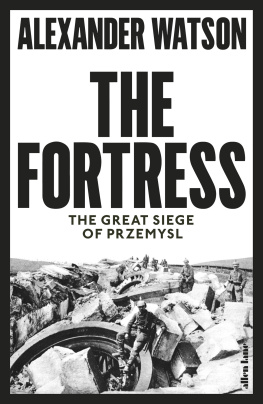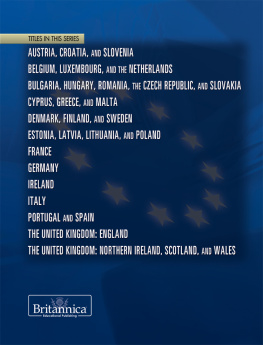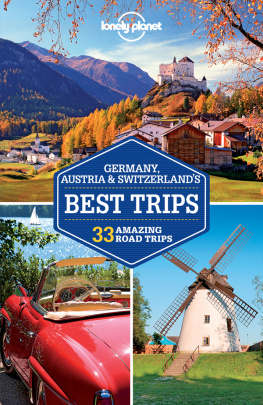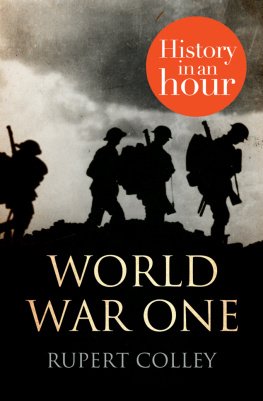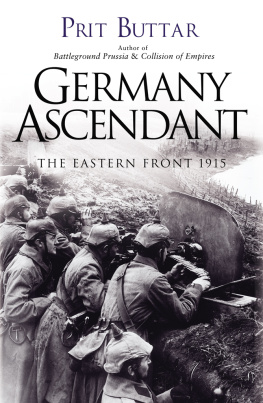Ring of Steel

Copyright 2014 by Alexander Watson
Published by Basic Books,
A Member of the Perseus Books Group
Published in 2014 in the United Kingdom by Allen Lane, an imprint of Penguin Books
All rights reserved. No part of this book may be reproduced in any manner whatsoever without written permission except in the case of brief quotations embodied in critical articles and reviews. For information, address Basic Books, 250 West 57th Street, New York, NY 10107.
Books published by Basic Books are available at special discounts for bulk purchases in the United States by corporations, institutions, and other organizations. For more information, please contact the Special Markets Department at the Perseus Books Group, 2300 Chestnut Street, Suite 200, Philadelphia, PA 19103, or call (800) 8104145, ext. 5000, or e-mail .
LCCN: 2014943628
ISBN (ebook): 978-0-465-05687-3
10 9 8 7 6 5 4 3 2 1
For Ania
Contents
While writing this book, I have been the beneficiary of many acts of great kindness. My first thanks are to David Stevenson for recommending me to Penguin to write the book, and to Niall Ferguson, who taught me a good deal of what I know about writing history. I am extremely grateful to my editors, Simon Winder and Lara Heimert. Simon approached me with the exciting idea of a history of the war from the Central Powers perspectives, and ever since my first book proposal he has been a source of inspiration and uplift. From Lara, I received immensely valuable feedback, which greatly improved my manuscript. Both have shown superhuman levels of patience and understanding.
Over the past six years, I have been fortunate to work at three excellent institutions, the University of Cambridge, the University of Warsaw and Goldsmiths, University of London. My colleagues there and in other places have been extremely supportive. I am especially grateful to Bernhard Fulda for many thought-provoking conversations, for his hospitality in Berlin, and above all for reading and giving detailed feedback on the bulk of the manuscript at very short notice. Other friends and colleagues were also generous with their time. Jonathan Gumz, Stephan Lehnstaedt and Richard Grayson all read and provided incisive comments on individual chapters. I owe thanks to Piotr Szlanta for helping me integrate into Warsaw academic life, and to Philipp Stiasny for providing material on films and for always being such a generous and exuberant host whenever I visit Berlin. Anatol Schmied-Kowarzik also kindly sent me material. John Deak taught me how to find my way through the maze of files in the sterreichisches Staatsarchiv, and Tim Buchen pointed me in the direction of valuable sources from Jerusalem. At Goldsmiths, I am extremely grateful to Jan Plamper, Richard Grayson and Stephen Pigney for rescheduling teaching and putting themselves to inconvenience so that I could finish my manuscript. More generally, I wish to thank Heather Jones, Holger Afflerbach, Peter Holquist, Nathaniel Wood, Alan Kramer, John Horne, Jens Boysen, Julia Eichenberg, Jonathan Boff, Jarosaw Centek, Brian Feltman, Tom Weber and Hugo Service for conversations that have helped shape my view of the First World War, and especially the experience of it in east-central Europe. Lastly, I am grateful to those senior colleagues who have supported me at critical moments during the last decade, most especially Sir Hew Strachan, Christopher Clark, Sir Richard Evans, Richard Bessel and Tomasz Kizwalter.
The research for this book could not have been undertaken without support and opportunities offered by funding bodies. A British Academy Postdoctoral Fellowship supported me at Cambridge University between 2008 and 2011, an experience that I value as one of the most exciting and intellectually stimulating of my life. The research funds that came with the Fellowship permitted visits to archives in Poland, Austria and Germany. In 201113, I held a 7th European Community Framework Programme Marie Curie Intra-European Fellowship (No. PIEF-GA-2010-274914). The work that I undertook was for a different project, but I still owe the European Commission thanks here. There are few other opportunities for a British academic to spend two years on the other side of Europe, and without this grant it would have been far more difficult to improve my Polish language skills and impossible to gain the same familiarity with Polands excellent libraries and superlatively organized and stocked archives. I also would not have had the chance to work at Warsaw Universitys Institute of History, an experience that taught me much and made me a better historian. I am sincerely grateful. Lastly, I thank the Institute of Historical Research in London for a Scouloudi Historical Award. This funded preliminary archival research in 2008.
There are two groups of professionals to whom I owe thanks. The first are archivists. To write this book I used material from archives in five countries. I am extremely grateful to the staff of the Bibliothek fr Zeitgeschichte, Stuttgart; the Bundesarchiv Berlin-Lichterfelde; the Bundesarchiv-Militrarchiv Freiburg; the Deutsches Tagebucharchiv, Emmendingen; the Geheimes Staatsarchiv Preuischer Kulturbesitz, Berlin; the Generallandesarchiv Karlsruhe; the Hauptstaatsarchiv Dresden; the Hauptstaatsarchiv Stuttgart; the Hessisches Hauptstaatsarchiv, Wiesbaden; the sterreichisches Staatsarchiv; the Central Archives for the History of the Jewish People, Jerusalem; the Archiwum Archidiecezjalne w Poznaniu; the Archiwum Narodowe w Krakowie; the Archiwum Pastwowe w Katowicach: Oddzia w Raciborzu; the Archiwum Pastwowe w Olsztynie; the Archiwum Pastwowe w Poznaniu; the Archiwum Pastwowe w Toruniu; the Biblioteka Narodowa, Warsaw; and the Imperial War Museum and the National Archives in London. Additionally, I would like to thank the ever-friendly and helpful staff of the Archive of Modern Conflict, London; the Museum Historyczne Miasta Krakowa; the Muzeul National Brukenthal, Sibiu; and the Bildarchiv der sterreichischen Nationalbibliothek, Vienna, for providing many of the photographs in this book.
The second group are those people who helped prepare and who produced the book. Rumen Cholakov found and translated Bulgarian source material for me. My agent, Andrew Kidd, was on hand to guide me through the publishing world. At Penguin, Richard Duguid oversaw the production process. I thank the teams at Penguin and Basic Books, especially Marina Kemp and Leah Stecher. I am also very grateful to my copy-editor, Richard Mason, for being so exacting in his corrections of my text.
One of the points this book makes is the importance of family, and I know how lucky I am with my family. My mother and father, Susan and Henry, and my brother Tim have always been an immense support, and I am very grateful for their love and encouragement during the writing of this book. They and the others close to us, Aunt Judy, Peter and Jana, bore with patience and humour the long period in which I was finishing this book. I owe Lindsey and Caley special thanks for their understanding. I am also grateful to my relatives in Poland. Alfred and Wiesia Czogaa followed the books progress with enthusiasm and offered a loving home from home in the south. Wojtek and Marysia Burkiewicz and their sons Mateusz, Micha and Marcin all looked after me during my time in Warsaw.
The last thanks, to my wife and daughter, are most important. My daughter, Maria, arrived in the final months of the writing of this book, and every day of her life brings immense joy and new meaning to mine. To my wife, Ania I simply could not have written this without you. Thank you for your love, your understanding and your patience, and thank you for keeping a sense of perspective when I was losing mine.
Next page

